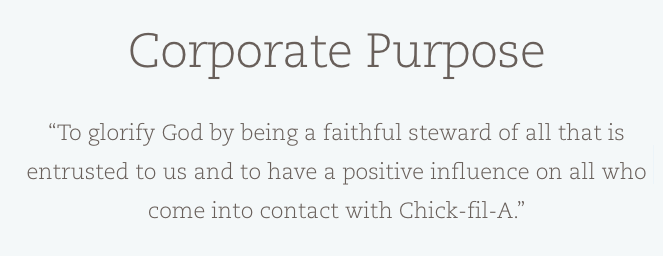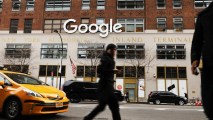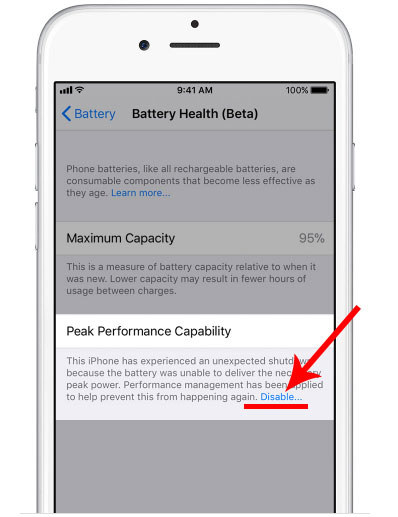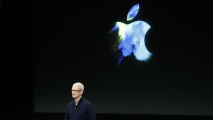
via Future Tense - RSS text feed https://ift.tt/2uCyOQs


Just down the street from the Freedom Tower in New York City, the fried chicken sandwich chain Chick-fil-A’s newest restaurant, and its largest to date, opened on Thursday morning. The eatery spirals up five stories, rising from a basement-level kitchen to cashiers on the ground level, and up through two levels of indoor seating that are capped by a rooftop deck. There’s seating for 140 people.
The opening of the behemoth store reflects the franchise’s quickly changing position in the fast food matrix. With about $9 billion in sales in 2017, the Atlanta-based restaurant — as well known for its sandwiches as for its strong Christian values — today ranks seventh nationwide among fast food chains in terms of sales, but it’s on track to become the third-largest in the next two years, behind McDonald’s and Starbucks, according to restaurant consultancy Technomic.
“The trajectory we’re on would support that,” said a Chick-fil-A spokesperson when asked about the possibility of rising to the top three by 2020.
Helping to fuel this growth is technology such as mobile ordering and on-site ordering by tablet, which have sped up Chick-fil-A’s service, brought in new customers, and encouraged old customers to come more often. Yet digital progress presents a challenge to Chick-fil-A: how to translate its trademark cheery service and abundant free food in stores — which helped create its loyal customers in the first place — when its primary point of contact with some customers becomes a touchscreen.
These small details in service are “part of the context in which we operate Chick-fil-A,” said the company’s vice president of restaurant experience, David Farmer, who describes his mission as creating “[NASCAR] pit crew efficiency, but where you feel like you just got hugged in the process ... We’d better not lose our edge relative to service and hospitality.”
Thus far, this edge has paid off. The company scores well above fast food chains overall when it comes to satisfaction, positive buzz, and likelihood of purchase, according to YouGov BrandIndex.
“The pathway is in Chick-fil-A’s favor in terms of continuing to leapfrog iconic chains that are still doing fine,” said Technomic senior principal David Henkes. Old-school fast food companies are doing well again after years of losing ground to higher-end chains like Chipotle, he said, “but Chick-fil-A is doing phenomenally.”

View from the rooftop deck of Chick-fil-A's new Manhattan store.
Courtesy of Chic-Fil-A
Since its first location opened in 1967 in Atlanta, Chick-fil-A has steadily expanded, recently branching further away from its Southeast home base. It opens about 100 new stores each year, amounting to 2,300 total locations today, and they manage to stay remarkably busy.
The average Chick-fil-A restaurant rings up more than $4 million in annual sales, according to QSR magazine, millions more than virtually any other restaurant chain’s locations, including giants like McDonald’s, Burger King, and Wendy’s — despite Chick-fil-A being open just six days a week. (All restaurants close on Sundays.) The average McDonald’s, for instance, makes about $2.5 million per year.
“We’re constantly keeping our eyes on the horizon, and what major tech shifts could be happening,” said Michael Lage, Chick-fil-A’s senior manager of customer digital experience. “We want to be even faster, more personal, more convenient.”
Farmer describes his mission as creating “[NASCAR] pit crew efficiency, but where you feel like you just got hugged in the process.”
In just the last few years, digital upgrades like the Chick-fil-A One app, which spent a week at the top of Apple’s App Store when it launched in 2016, and ordering on-site by tablet, which began in 2014, have helped to move an unthinkable number of customers through its stores. One drive-thru in Oklahoma City recently served 216 cars in one hour, according to a company spokesperson. Chick-fil-A’s first New York store rings up between 2,500 and 2,600 transactions on busy days, owner Oscar Fittipaldi told BuzzFeed News, and he said some locations are even busier.
“We have become a big company,” said Bryan Bullington, a Chick-fil-A owner in Houston who runs one of its most-visited locations. The chain has come a long way since he joined in 2001, he said, when it did not accept credit cards, a subject that sparked a big battle internally at the time. Today, Bullington said, some owners are even advocating for cash-free stores.
“Technology, competition, healthy food trends, and on-demand delivery are all pressing in on us. The cost pressures with food and insurance and a better work environment have all changed dramatically since I came to Chick-fil-A. But fundamentally we’re the same… We’re still chicken,” Bullington said.
As more people drift from shopping at brick-and-mortar stores to the internet, Chick-fil-A’s innovation efforts are focused not on new menu items, but on improving wait times and keeping customers flowing through. Chick-fil-A’s Farmer said, “The closest Chick-fil-A to my home is in the parking lot of a Target. And I just don’t go to Target because of online shopping.”
The shift of shoppers away from physical stores may not appear to be an obvious threat to restaurants, but it's one that former Starbucks CEO Howard Schultz has been warning about for years, calling it a “seismic change” in consumer behavior. Starbucks, which has led the restaurant industry in leveraging consumer-facing technology, launched a mobile order and pay app nationwide in 2015 that now represents 11% of US transactions for the company.
“Convenience is the big thing,” said Lage. Chick-fil-A’s app has been downloaded by 10 million users so far. And the chain, like so many others, is now testing options for meal delivery.
Yet even as massive sales volumes pressure Chick-fil-A to shorten some interactions with customers and bypass others, Farmer said he remains committed to old-fashioned hospitality. “I don’t think that’s everybody’s angle, but it’s our angle. You have a transaction and it’s functional and it works. But where do you go where the transaction is uplifting?”
Chick-fil-A’s ascent was no sure bet even five years ago. In 2013, the company was the ninth-largest fast food chain in the US, and it was still reeling from a public relations fiasco set off a year earlier when then-chief operating officer Dan Cathy (now CEO), made public comments against same-sex marriage, saying he supported “the biblical definition of the family unit.”
Consumer threats to boycott the chain didn’t meaningfully impact business — in the five years since the controversy erupted, Chick-fil-A’s overall sales roughly doubled and hundreds of successful new restaurants have opened. But Cathy’s comments cast a long shadow, even as Chick-fil-A withdrew from political commentary as a matter of corporate strategy.
In 2015, the Denver City Council delayed approval of a new Chick-fil-A in Denver International Airport over concerns of discrimination. (It was approved after the company reassured the council of its employment policies.) A spokesperson told BuzzFeed News, “Do we have gay team members? Yes. Do we have straight team members? Yes. Do we distinguish when we tell their stories of service? No.”
In 2016, several months after Chick-fil-A’s high-profile opening of its first store in New York City, Mayor Bill de Blasio discouraged people from supporting the business. “What the ownership of Chick-fil-A has said is wrong,” the mayor said at a press conference at the time.
Years later, questions still linger about Chick-fil-A’s politics, despite the company’s silence. Asked about a 2017 ThinkProgress post that said the chain continues to donate to anti-LGBT organizations — it named the Fellowship of Christian Athletes and the Salvation Army — a spokesperson replied, “The Chick-fil-A Foundation is focused on supporting youth in the areas of education, entrepreneurship, and development of emerging leaders — including more than $46 million in scholarships to Team Members.”
And while the 2012 incident cemented the company’s image as a Christian restaurant for some consumers, Farmer said its founder, who died in 2014, “never saw Chick-fil-A as a Christian business. That label made him uncomfortable.”
Today Chick-fil-A’s stated corporate purpose remains unchanged: “To glorify God by being a faithful steward of all that is entrusted to us and to have a positive influence on all who come into contact with Chick-fil-A.”

Chick-fil-A
“It got controversial a few years ago with the Christian focus of the owners, but it doesn’t seem to have slowed Chick-fil-A at all. If anything, their growth has accelerated,” said Henkes. “I still see traces of that [controversy] at times. But it’s probably more a thing on the internet and on Twitter than in real life.”
Chick-fil-A is trying to move as far away from that controversy as possible, saying simply that the company treats everyone with “honor, dignity and respect,” and it's leveraging technology to provide a great customer experience.
“The focus at corporate, the leading measure, is to focus on doing the right thing, the right work. If we get better, growth will follow closely behind,” said Bullington. ●



On Friday, Sen. Ed Markey of Massachusetts hinted at the prospect of Congress regulating Facebook in response to a top Facebook exec's 2016 memo that had urged the company to connect people at all costs.
"It is @facebook’s moral obligation to maintain the integrity and safety of their platform. When they fail to do so, Congress must act," Markey tweeted.
The internal Facebook memo, written by the company's vice president Andrew “Boz” Bosworth, put forth an argument for growth at all costs, which sparked a major debate and a significant amount of blowback inside Facebook when it first published in 2016, and when it resurfaced this week.
“We connect people. Period," Bosworth wrote. "That’s why all the work we do in growth is justified. All the questionable contact importing practices. All the subtle language that helps people stay searchable by friends. All of the work we do to bring more communication in. The work we will likely have to do in China some day. All of it."
The memo, originally intended for Facebook employees only, was revealed by BuzzFeed News on Thursday. Following its publication, Bosworth said he didn't believe it when he wrote it. "It was intended to be provocative. This was one of the most unpopular things I’ve ever written internally and the ensuing debate helped shape our tools for the better," he tweeted.
Facebook CEO Mark Zuckerberg responded to the memo too. "We recognize that connecting people isn't enough by itself. We also need to work to bring people closer together. We changed our whole mission and company focus to reflect this last year," Zuckerberg said in a statement provided to BuzzFeed News.
Though Markey indicated congressional action may be on the table, it's unclear what form it would take. The only legislation in Congress that would touch Facebook is the Honest Ads Act, which Markey is a cosponsor of, but that bill has been stalled for months. Markey shared no new ideas for legislation in his tweet.
Asked what Congress could do to maintain the integrity and safety of Facebook, Sen. Markey's office shared the following statement with BuzzFeed News: “Senator Markey has consistently advocated for safety, privacy, and transparency online, from co-sponsoring the Honest Ads Act to calling for Facebook and Instagram to prohibit postings for gun sales on their platforms. In light of the recent Facebook revelations, Senator Markey has explicitly called on Mark Zuckerberg to testify before the Senate Commerce Committee in order to gather the facts and chart a path forward.”

Archaeology is providing insights into the importance of children in our earliest communities and the role they may have played in our social, cultural and physical development, writes Michelle C. Langley.















Chesnot / Getty Images
In December, Apple admitted to something people had long suspected: It slows down iPhone performance speeds in devices with older batteries to prevent unexpected shutdowns. After customer outcry, the company lowered the price of battery replacements from $79 to $29, and promised to add an option that would allow users to toggle the slow down “feature” on and off. A beta version of this new setting, called iPhone Battery Health, is included in today’s new version of iOS.
Today also happens to be the day of a legal meeting in Atlanta that will determine if dozens of individual suits over slowed iPhones will be combined into one class-action case.
Anyway, here’s how to prevent an iPhone with an older battery from slowing down — and why you might not want to disable the slowdown setting after all.
There’s a small chance that updating your software could delete your data or “brick” (ie. render useless) your device, which means it’s a really, really good idea to back it up.
To back up with iCloud, you’ll need to be connected to a Wi-Fi network. In Settings, tap on your name at the top > select your device (it’ll say “This iPhone” right underneath) > iCloud backup > Back Up Now.
If your iCloud storage is full (story of my life lol), you can also back up via iTunes on your computer. Connect your device to your computer and open iTunes. Select the device, and under “Automatically Back Up” select “This Computer” then “Back Up Now.” If you ever need to restore your device (or a new one) from back up, plug it into this computer and open iTunes to do so.
BTW, a good way to clear up space is identifying what’s taking up so much space. Go to Settings > General > iPhone Storage. If photos and videos are the storage hogs on your device, consider using Google Photos, which offers unlimited storage at 16MP or less resolution and has a setting that automatically removes media that’s already been backed up. Amazon Prime members receive unlimited photo storage through Prime photos (but only 5GB’s worth of videos).

Nicole Nguyen / BuzzFeed News
Go to Settings > General > Software Update. Make sure you’re connected to a Wi-Fi network!
FYI: You’ll only see this feature if you have an iPhone 6 or newer (sorry iPhone 5S holdouts 🙁).

Nicole Nguyen / BuzzFeed News
This battery settings page is where you’ll be able to see if your battery needs to be replaced. If your phone does not support “peak performance capability” (read: your iPhone battery is old and Apple sometimes slows down your device as a result), you’ll see an option to disable the “power management” feature (in a very small blue font at the bottom). Tap “Disable…” to turn it off.

Nicole Nguyen / BuzzFeed News / Via support.apple.com
It should be noted that while you may see increased speeds, turning off the device’s power management feature may not result in the best experience.
As your iPhone’s battery gets older, it decays over time, and as it degrades, it can no longer handle demanding tasks, like running processor-intensive games, as well as it once could. After 500 charge cycles, the iPhone battery is designed to retain only 80% of its original capacity. So depending on use, you may start to see your iPhone's battery life dwindle after a year or so.
That’s why Apple slows down your iPhone’s processor when it’s running on a decayed battery. When the processor is running full throttle, your iPhone is at risk for malfunctioning and shutting down unexpectedly. You may see this kind of shutdown more often if you turn the “power management feature” off.
LINK: iPhone Users Are Mad That Battery Replacements Are Backlogged Until March or April















Daniel Leal-Olivas / AFP / Getty Images
Facebook is rethinking its approach to data collection amid the Cambridge Analytica privacy crisis that’s sent its share price spiraling and may finally force its CEO, Mark Zuckerberg, to testify before Congress.
“If data isn’t helping people, we shouldn’t use it,” Facebook chief product officer Chris Cox told BuzzFeed News on Tuesday. “This past week has underscored that we can do better. We’re going through our tools and approach with a fine-toothed comb.”
Cox’s remarks indicate that Facebook, the world’s preeminent personal data collector, is reconsidering the fundamentals of its data-reliant products and ad business as it deals with the scandal.
For the first time, the company seems be weighing whether it must rebuild its products in a way that relies on less gobbling of user data, or whether it can continue to get away with its current data-sucking model. By all indications, the company believes it won’t change its products much — just last Thursday, Facebook COO Sheryl Sandberg told CNBC, "We believe we can operate our business with our current business model.” But Cox indicated that Facebook is at least examining the way its products work, and asking whether the data collection used to power them is good. “We’re taking a hard look in the mirror on this one,” he said.
Cox’s remarks come as public furor has persisted over the Cambridge Analytica scandal. The episode, set off by a whistleblower who outlined how Cambridge Analytica obtained and used data from 50 million Facebook user profiles in violation of Facebook’s rules, has set off a widespread scrutiny of Facebook’s inner workings and privacy controls.
Elected officials, the press, and the public have all reacted to the news by directing their ire not only toward Facebook’s once very lax developer policies, but also to the core of its service. In the days following the Cambridge Analytica news, #DeleteFacebook has trended on Twitter (yet Facebook has simultaneously climbed the App Store charts), and people have been downloading copies of their data that Facebook has collected.
In response, Facebook has gone on an apology tour and introduced a number of fixes. It will now prevent developers from storing data on users that haven’t used their services for three months; it’s planning to audit thousands of apps that may still have caches of users' data; and Wednesday, it introduced a new privacy center page that attempts to make it easier for people to review and manage their data and who has access to it.
Cox suggested that Facebook will continue to heavily rely on data for its products and services. “We want to understand which data is giving people great experiences in ads, feed, search, messaging, and relevance systems,” Cox said. “On top of that, we should be clear about how data is used, and offer easy ways to control it.”
So far, Facebook has only made a few tiny tweaks in response to the Cambridge Analytica crisis. It’s yet to be seen whether it will simply refurbish the facade of its platform, or if it will rebuild its services from the ground up. Referring to Wednesday’s privacy center announcement, Cox indicated additional steps are on the way. “It’s just a small step,” he said. “There’s more to come.”



No more will the WikiLeaks founder be able to tweet or send other messages from inside the Ecuadorian Embassy in London.

Assange, an Australian who was granted Ecuadorian citizenship earlier this year, has been camped out in the Ecuadorian Embassy in London for the last six years, where he initially took refuge from being extradited to Sweden on rape charges. (Swedish prosecutors dropped those charges last year, but he still faces arrest in the UK.) Since then, he has been something of a thorn in the embassy's side, with not infrequent clashes between Assange and embassy staff.
Justin Tallis / AFP / Getty Images

That measure, however, was at the time described as a "temporary measure" by the Ecuadorian government. There was no such qualifier in Wednesday's announcement.
Justin Tallis / AFP / Getty Images

